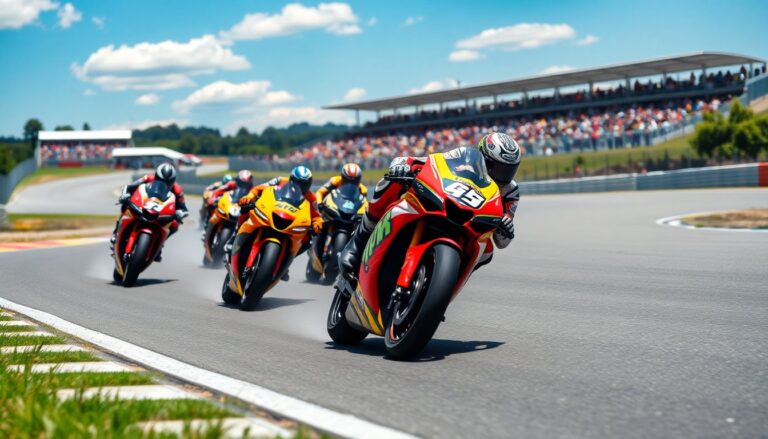Argomenti trattati
Understanding Grand Prix motorcycle racing
Grand Prix motorcycle racing represents the pinnacle of motorcycle road racing competitions. Established in 1949 by the Fédération Internationale de Motocyclisme (FIM), this prestigious championship has evolved significantly. It now features multiple classes, including MotoGP, Moto2, Moto3, and MotoE. Each class highlights different aspects of motorcycle racing, with MotoGP serving as the premier category, originally known as the 500cc class.
The motorcycles within this elite league are far from ordinary; they are meticulously designed for racing and cannot be legally ridden on public roads. This exclusivity underscores the high-performance nature of the sport. Over the years, significant changes have shaped racing, particularly in engine regulations. For instance, the 500cc category permitted a maximum of four cylinders until the early 2000s, marking the gradual phase-out of two-stroke engines.
Championship structure and scoring system
In Grand Prix motorcycle racing, the competition extends beyond mere speed; it encompasses strategy and skill. Points earned during these exciting races contribute to two separate championships: one for riders and another for constructors. Although these championships are distinct, they share the same scoring system. Points are awarded based on finishing positions, with the top 15 riders receiving points that range from 25 for first place to 1 for fifteenth. This point system has evolved over the years. While the current rules are universally applied, earlier formats occasionally limited the number of race results counted towards the championship.
Notable champions and records
Notable figures in motorcycle racing history
Throughout the history of motorcycle racing, several riders have made significant contributions to the sport. Giacomo Agostini stands out with an impressive total of eight championships, including a remarkable streak of seven consecutive titles from 1966 to 1972. His dominance during this period set a benchmark for future competitors.
In contrast, Marc Márquez captured attention as the youngest champion in the sport’s history, earning his title at just 20 years and 266 days in 2013. This achievement not only showcased his talent but also signaled a new era in motorcycle racing.
Italian riders have made a significant impact in the championship landscape, securing a total of 22 championships among seven different competitors. The British riders are also notable, collectively achieving 17 championships with six competitors. The United States rounds out the strong presence with seven riders who have contributed to a total of 15 championships. The journey began in 1949 when Leslie Graham clinched the inaugural championship, setting the stage for future successes.
Records and achievements in racing
The competition in Grand Prix motorcycle racing remains intense, with numerous riders competing for the prestigious title of the best. Valentino Rossi holds the remarkable record for the most race victories in this premier class, with an impressive 89 wins. Following him is Marc Márquez with 73 wins, and Giacomo Agostini, who claimed 68 victories throughout his illustrious career.
Youngest and oldest champions
In terms of age records, Can Öncü made history as the youngest Grand Prix winner at just 15 years and 115 days, triumphing in the 2018 Moto3 Valencian Grand Prix. Conversely, Arthur Wheeler holds the title of the oldest Grand Prix winner, achieving victory at the age of 46 in the 1962 250cc Argentine Grand Prix. These extraordinary records underscore the diverse talents and unwavering dedication present within the sport.
The championship is constantly evolving, showcasing emerging riders while established legends solidify their legacies. Looking forward, the excitement of Grand Prix motorcycle racing continues to captivate fans and participants, promising thrilling moments ahead.

